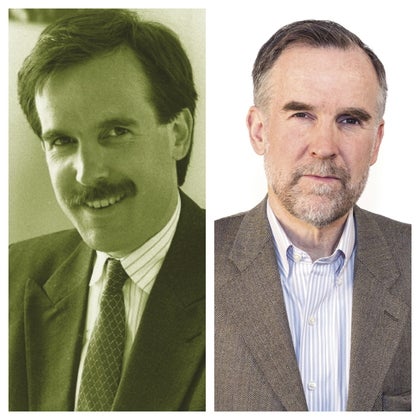Processing Your Payment
Please do not leave this page until complete. This can take a few moments.
From the Publisher: A look back, a look ahead - 35 years of covering Central Mass. business news
As a 1979 Holy Cross graduate, I returned to Worcester in September of 1980 to start my publishing career in advertising sales.
- WBJ 35th Anniversary special editionWBJ 35th Anniversary special edition
The legacy of ambition: Exploring the staying power of six of the region's most enduring businesses
Fred Hurlbrink Jr. - WBJ 35th Anniversary special editionWBJ 35th Anniversary special edition
Photo trivia!!! Can you match these business leaders with their older photos?
- WBJ 35th Anniversary special edition
- WBJ 35th Anniversary special editionWBJ 35th Anniversary special edition
1989-2024: A timeline of the top Central Mass. business stories for the last 35 years
- WBJ 35th Anniversary special editionWBJ 35th Anniversary special edition
More diverse businesses: The complex journey toward diversifying Central Massachusetts business leadership
While Central Massachusetts business leaders have seen substantial diversification among small business owners in the past three decades, the same cannot be said for those among the area’s highest-paid.
- WBJ 35th Anniversary special editionWBJ 35th Anniversary special edition
Feasting on nostalgia: Take a spin around the Central Mass. culinary scene alongside an admired food writer who has seen it all
Barbara Houle"I’ll admit that writing about the Worcester County restaurant scene spanning 35 years has made my head spin," writes Barbara Houle.
- WBJ 35th Anniversary special editionWBJ 35th Anniversary special edition
Where are they now? Gone but not forgotten, these Central Mass. difference-makers make their marks in new ways
T.J. GaudetAs leaders, they ably represented two of Central Massachusetts’ longest-running institutions: each intricately tied to Isaiah Thomas. One turned his bequeathed library into the world’s preeminent repository of pre-20th-century print materials in what is now the United States. The other invoked the patriot printer’s name for its annual award to citizens who serve Worcester with distinction.
- WBJ 35th Anniversary special editionWBJ 35th Anniversary special edition
The Galleria to CitySquare, a Worcester odyssey: A look at the rise, fall and resurgence of the city center
Laura FinaldiLike so many of the nation’s indoor shopping centers, the Galleria slowly died over the 20 years after it opened. Today, the former mall space is known as CitySquare.
- WBJ 35th Anniversary special editionWBJ 35th Anniversary special edition
Crowd pleasers: Top tourist destinations have delivered big
Susan ShalhoubTracking Central Massachusetts tourist locations’ decisions and challenges – and how they handled them over the last three decades – is an exercise in business strategy. How do you get people to keep coming to your attraction?
- WBJ 35th Anniversary special editionWBJ 35th Anniversary special edition
The company you keep ... or don't: Once synonymous with their communities, these Central Mass. businesses have moved on in distinct ways
Laura FinaldiAs the economic climate has shifted over the decades, some Central Massachusetts companies have left the region.
-
- WBJ 35th Anniversary special editionWBJ 35th Anniversary special edition
The Devens evolution: A three-decade transformation of the shuttered Army base is bearing fruit. What’s next for the budding innovation hub?
Laura FinaldiThe U.S. military base known as Fort Devens closed in 1996, jettisoning more than 7,000 local military and civilian jobs.
- WBJ 35th Anniversary special editionWBJ 35th Anniversary special edition
Transforming communities: These three Central Mass. municipalities have taken different roads to revitalization
Livia GershonCentral Massachusetts is a region that likes to wax nostalgic about bustling main streets and tight-knit mill communities. A lot has changed over the decades, with shifts in the way people do their shopping, the decline of traditional manufacturing, and the rise in tech industries. And our communities have shifted with the times.
- WBJ 35th Anniversary special editionWBJ 35th Anniversary special edition
Out of the weeds: From prohibition to profits, the last 35 years have seen big changes in cannabis
In 2016, 53.6% of Massachusetts voters cast a ballot in favor of legalizing marijuana like alcohol, kicking off the creation of an industry that has so far led to more than $6 billion in sales.
- WBJ 35th Anniversary special editionWBJ 35th Anniversary special edition
Fast forward to 2034: In health care, drones and AI raise hopes and concerns
Sloane M. PerronThe proliferation of artificial intelligence and home health care, and the introduction of delivery drones are just some of the tools expected to change the future of medicine in Central Massachusetts and beyond.
- WBJ 35th Anniversary special editionWBJ 35th Anniversary special edition
Fast forward to 2034: At Worcester Regional Airport, momentum building toward more flights, airlines
Laura FinaldiIt’s been 35 years since Worcester Regional Airport saw its passenger traffic peak when 354,000 travelers passed through the airport’s terminal in 1989.
- WBJ 35th Anniversary special editionWBJ 35th Anniversary special edition
Fast forward to 2034: In higher education, colleges will meet students where they are
Susan ShalhoubBecker College’s 2021 closing contained a lesson for Central Massachusetts schools heading into the next decade.
- WBJ 35th Anniversary special editionWBJ 35th Anniversary special edition
Fast forward to 2034: Commonwealth Fusion Systems' attempt to provide carbon-free energy for the masses
Stephen UnderwoodWhile the prospect of commercial nuclear fusion energy in just 10 years may seem ambitious, one Devens-based company is working to make it a reality.
-
- WBJ 35th Anniversary special editionWBJ 35th Anniversary special edition
Fast forward 2034: For the workforce of the future, opportunities and equity loom large
T.J. GaudetThe coming years aren’t just about attracting laboratory and white-collar workers. More opportunities and training options will be needed for the region’s immigrant and lower-income populations to thrive.
- WBJ 35th Anniversary special editionWBJ 35th Anniversary special edition
Fast forward to 2034: Life sciences, the next big thing
Stephen UnderwoodAs the biomanufacturing sector continues to expand into a wide range of applications, billions of dollars are being spent on biomedical research, targeting diseases and improving patient outcomes with technology.
- WBJ 35th Anniversary special editionWBJ 35th Anniversary special edition
That’s what they said!: Central Mass. business quotes from the last 35 years
WBJ sources over the past 35 years have contributed memorable sentiments.























